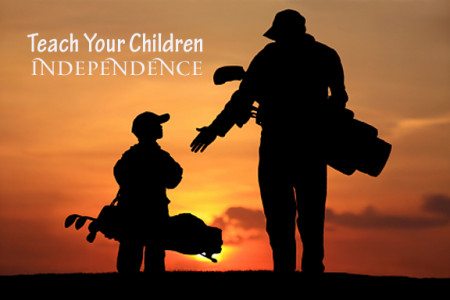Do you set out to make bread dough or to make bread? Do you set out to make cake batter or to make a cake? Following this line of thinking, are you raising children, or are you raising adults?
Do you over parent your child or worse still, pay someone else to do it for you?
Ask any group of adults one simple question: “What was the sweetest moment of your childhood?” Followed by, “Please raise your hand if your parents were present when that sweetest memory took place.” The result never varies much: Around 20 percent say their parents were part of their sweetest memory and 80 percent say their parents weren’t. As parents, we hope that we’re laying a foundation of happy memories for our children. When we’re confronted with the fact that our own best memories of childhood took place away from our parents, we’re a bit confused. That’s a slap in the face to dedicated Mums and Dads. Or is it?
The 20 percent whose parents were present to talk about their memories, they cite the kinds of moments parents work pretty hard to create: opening presents on Eid, cooking family dinner surrounded by relatives or having Mum or Dad read a favorite book at bedtime. When I ask for the sweetest moments without parents, most people tell a variation on a similar story: They were away from adult supervision, outdoors, with friends, facing a challenge and doing something a bit risky.
I remember taking my niece and nephew to a carnival of rides when they were 8 and 10. My sister had warned not to go on anything too “frightening” in direction opposition to her own youth which was always taking risks. I explained to the kids they could go on any ride as long as they didn’t complain to me if they made themselves queasy. The older boy made a decision to pace himself, his younger sister went on the scariest rides, 3 in a row until she stumbled off one and collapse on the ground unable to walk. Pale faced and looking ill, she offered no complaint, asked to rest a while and we moved on with our day. Later she said she had learned it was better to space out her scary experiences and allow her body to recover. A lesson she went on to teach her own children years later.
In Bahrain we are often blessed with home help, so many children are never taught to clean up after themselves or do the basic age-appropriate domestic duties. A teacher at my daughter’s school recently commented my husband was a “good Father” because he insisted our 6 year old carry her own bag. With parents, drivers and maids running after our children constantly it removes their opportunity to grow, their chance to shine and feel competent in their own achievements. It also creates dependent, lazy children who grow into dependent lazy adults. If your teenager is lucky enough to go abroad for study he will have to learn to take care of himself before he leaves or suffer greatly in the process.
Parents ask me questions about how they can help their child get over fears, learn to take risks, or become more responsible. No matter how loving the parents, it often seems to me that they are not going to be able to help their child through this challenge. Perhaps the child’s friends or an aunt will give him the courage he needs. The parents on the other hand need to encourage the child to pick up after themselves and give permission to the home-help to insist the child does so.
Children and adults need resilience to succeed. Resilience is being able to ‘bounce back’ from difficult times, setbacks, and other significant challenges. It includes being able to deal effectively with pressure and get through tough times with good outcomes. One of the best things for promoting resilience is a belief that we are competent and able to complete difficult challenges. Our kids can’t do this if we remove all opportunity for growth.
Parents who identify their children’s strengths and help them develop those strengths will see their children become increasingly competent. Their children will experience success. They will be inspired and confident. They will gain a sense that they have something to offer the world. Ali, a seven year-old, had trouble with reading and writing. His parents and teachers noticed his love for drawing so they encouraged Ali to draw by displaying his art in the classroom and at home. Ali’s strengths ensured he was not defined by his weaknesses in reading.
Despite the best-laid plans, problems are bound to arise. Appliances need repair, bicycles are stolen, cars break down or the debit card is lost. Your teen needs to be able to think about possible solutions on her own and solve and follow through. Good problem-solving skills are necessary to handle anything life may throw at your teen. In the final analysis, there are important things that we can’t do for our children, as much as we might want to. In order to grow in the ways they need to grow, children have to take the lead and usually away from us.
Michelle Bailey
Coach and Director EMEA Business Development
mbailey@emea-development.com
www.EMEAdevelopment.com

